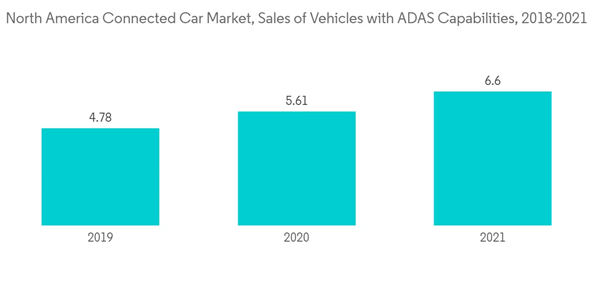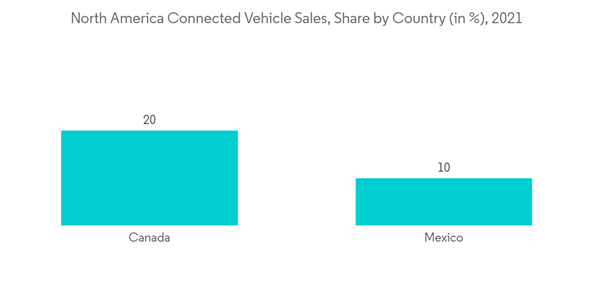As automotive manufacturers have resumed operations due to steadily rising automobile sales in countries with a limited number of COVID-19 cases, the market is likely to recover during the forecast. Furthermore, the manufacturers are implementing contingency plans to mitigate future business uncertainties to retain continuity with clients in the critical sectors of the automobile industry.
Over the long term, increasing investments in R&D by major industry players, rising Internet penetration, availability of 5G, falling data costs, and growing preference of customers for connectivity features over mechanical specifications of vehicles and a rise in sales of electric and autonomous vehicles are creating demand in the automotive and transportation industry with a surge in sales of connected vehicles in North American market.
Key players in the market are expanding their presence in digital mobility to cater to the increased demand for connected cars. For instance, in October, 2022: Ford Motor Co. opened Ford Atlanta Research and Innovation Center (FARIC) in Atlanta in United States, to accelerate the digital transfofmation in the company. The R&D Centre will focus on developing and testing new technologies for connected vehicles, application of artificial intelligence in obility and identifying new partnerships for university research in connected mobility.
The United States is anticipated to be the dominant market for connected cars in the region due to the large prescence of automotive OEMs, high levels of technology awareness amongst the general car buyers, preference for infotainment and telematics in vehiclles, wideperad adoption of 4G/5G and growing sales of electric, connected and autonomous vehicles in the country.
North America Connected Car Market Trends
Growing Adoption of 5G and Telematics to Produce Growth in the Market
The increasing usage of telematics is inducing growth in the market. Telematics is increasingly favored by fleet and vehicle owners to monitor their vehicles remotely for the purposes of safety, efficiency, predictive maintenance, and driver behavior. the various partnerships between vehicle OEMs and navigation service providers to offer in-built telematics in the vehicles are further expanding the market in the region.For instance,
- March, 2022: TomTom N.V. the global navigation specialist joined Foxconn and created MIH Consortium to build the next generation of electric vehicles (EV), autonomous driving, and mobility service applications. TomTom's expertise in digital cockpits and in-vehicle user experience (UX) for electric vehicles is anticipated to significantly benefit the MIH Consortium.
- April, 2022: Toyota Motor Corp. North America and navigation company MapBox partnered to build a new automotive navigation platform.
The growing adoption of 5G for in-vehicle connectivity is also predicted to drive the market in the coming years since latency for 5G is negligible compared to 4G/LTE which will significantly bump up the speed for data downloading and sharing inside the vehicles and the antcipated fall in the data costs of 5G as telecom majors will considerably invest in expanding 5G coverage and rolling out of cost effective 5G services to consumers. For instance,
- April, 2022: Stellantis NV partnered with Qualcomm Inc. for developing digital vehicle cockpits and 5G telematics technology which will be offered across all the vehicles from Stellantis' 14 brands.
- February, 2022 : Audi AG of Volkswagen Group and Verizon signed an agreement to develop 5G enbled vehicles. The agreement will focus on developing ultra-fast, low-latency alerts and messages along with information and entertainment to the Audi vehicles.
United States to Play Key Role in The Development of North American Connected Car Market
The United States will likely emerge as the largest market for connected cars in North America, followed by Canada and Mexico.According to some estimates, in the United States, 91% of new passengers sold in 2021 vehicles featured some in-vehicle connectivity which translates into 13 million vehicles. The growing sales of connected vehicles in the United States can be attributed to various factors like growing sales of electric and autonomous vehicles, the preference of car buyers for connectivity features over mechanical specifications of the vehicles, growing internet penetration, falling data costs, high levels of technological awareness and the introduction of 5G.
Electric and autonomous vehicles rely mainly on sophisticated chips, sensors, and advanced software for their operation, requiring in-vehicle connectivity. Thus increasing sales of electric and autonomous vehicles are contributing significantly to the growth of the North American Connected Car Market.
Canada is also witnessing a very healthy rise in the sales of connected vehicles. The reasons are growing internet penetration, reduced data costs, and rising usage of smart devices like smartphones.
Key players are engaging in partnerships and launching new products to secure their market position and stay ahead of the market curve. For instance
- January, 2022: Honda Motor Co. North America and Qualcomm Inc. announced a new collaboration to utilize the third generation Qualcomm connected digital cockpits to deliver premium and smart in-vehicle experiences for the upcoming Honda vehicles to be launched in the United States in the second half of 2022.
North America Connected Car Market Competitor Analysis
The North America Connected Car market is moderately consolidated. The market is characterized by considerably large global players and some local players who have secured long-term supply contracts with major infrastructure companies. These players also engage in joint ventures, mergers and acquisitions, new product launches, and product development to expand their brand portfolios and cement their market positions.Some major players dominating the global market are General Motors, Ford Motor Co., Toyota, Motor Corp., Stellantis NV, and Tesla Inc. Key players are engaging in mergers and acquisitions and launching new products to secure their market position to stay ahead of the market curve. For Instance,
- May, 2022: General Motors and Red Hat Inc., an IBM company, announced a partnership to accelerate General Motors' software-defined vehicle programs through the automaker's new Ultifi software platform. This collaboration will integrate Red Hat Inc.'s In-Vehicle operating systems with the Ultifi platform.
- March, 2022: BMW Group North America announced that the all-new 2022 BMW iX and i4 would feature T-Mobile's, a Deutsche Telekom company, Magenta Drive, which will turn these vehicles into Wi-Fi hotspots with benefits like in-car connectivity and unlimited voice calling.
Additional benefits of purchasing the report:
- The market estimate (ME) sheet in Excel format
- 3 months of analyst support
This product will be delivered within 2 business days.
Table of Contents
Companies Mentioned (Partial List)
A selection of companies mentioned in this report includes, but is not limited to:
- Tesla Inc.
- General Motors
- BMW AG
- Audi AG
- Volvo
- Volkswagen AG
- Stellantis NV
- Toyota Motor Corp.
- Honda Motor Co.
- Mercedes-Benz AG
- Hyundai Kia Automotive Group
- Jaguar Land Rover Limited
- Nissan Motor Co. Ltd
- Ford Motor Company










